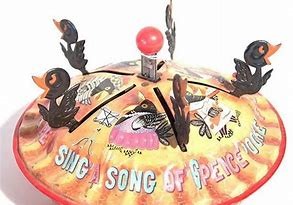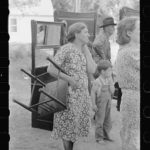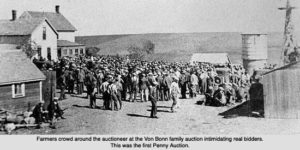
By Robin Mayes, Gallant Farm Educator
I have never gambled, but I feel that bidding at an estate auction may evoke the same rush of adrenaline as pulling down the handle of a slot machine in Vegas. The difference with auction bidding is that you aren’t really ‘out anything’ if you lose … except for that coveted item you had hoped to obtain. You can end up quite a way into the negative, however, if bidding fever takes hold and you blow right past that sensible limit you had set in your mind only moments before. The next thing you know, that auctioneer is hollering, “Sold!” and pointing at you as you realize you have just pledged to pay way too much for that cracked crock with the bright cobalt blue “2” on it!
My mom introduced me at a young age to estate auctions. We might while away a whole Saturday afternoon in the shade of big oak trees on the lawn of an old farmhouse. Sometimes we packed a picnic. Occasionally there were fruit trees or berry bushes from which to scavenge snacks. If we had some cash to spare there was almost always a bake sale or a food truck to support.
What fun it was to dig through a box of junk Mom had just won for a mere 25 cents! I still remember finding a somewhat rusty and battered tin lithograph toy. It was shaped like a pie and when you wound it up it played the tune “Sing a Song of Sixpence,” and at the end blackbirds popped up! I loved that clever mechanical toy for years. When my kids were young, auctions gave us many entertaining Saturday afternoons, and my kids would gleefully dig through a box of “junk” I had just won for $1. They also learned how to deal with disappointment when something they had their eye on went too high. Which happened frequently for us!
One common selling practice at auctions is the “winner takes choice” strategy, employed if there are several of the same type of item. One that comes to mind was the auction of items belonging to a lady who had collected glassware. She must have had 75 glass “hen-on-a-nest” candy dishes. Of course, they were all different colors and quality. To liquidate this type of inventory, an auctioneer will put ten of them on the table and take bids for “choice.” The winning bidder then gets to choose the one he wants from the group. If he wants more than one, he can choose to pay his bid times the number of items he takes. Once he has made his choices, anyone else willing to pay the same can choose any he wants. Then bidding begins again. If only a few less-than-desirable ones remain, they are “all for one money.” Believe it or not, I attended an auction of HOUSES that were sold by the “winner takes choice” method! I could not believe it.

When I got a little older, I realized the touch of sadness that accompanied an estate auction; at some point I noticed that small clutch of people at every auction who were not enjoying the festivities like the rest of us. These are the family members who have recently lost Grandma or Grandpa. An auction is often the most efficient way to dispose of the furnishings and belongings and settle the bills of the estate. But it can be heart-wrenching for the family to see their memories strewn across the yard and being carried away by strangers. Depending on the terms of the late loved one’s will, family members may have to bid on the heirlooms they want to keep. You could read shock and dismay on the faces when some long-forgotten item would end up on the auction block. Sometimes, in the spirit of the “Penny Auctions” of the past, those in attendance might agree as a group to refrain from bidding against family members who were trying to retain cherished items.
Penny Auctions came about during the Great Depression and happened frequently out in the Dust Bowl region where the economy and the severe drought caused even greater hardships for farmers. Banks were foreclosing and selling off everything – including personal items – to recoup their losses. The family could be left with nothing but the clothes on their backs … until the Penny Auctions. It is thought that the first happened in Madison County, Nebraska. The bank was auctioning the equipment of the Von Bonn family.

When the first item was put up for bid, the response was 5 cents. When someone else began to up the bid, he was “convinced” by those around him not to do so. The auctioneer had no choice but to sell the piece for 5 cents. Everything sold for pennies that day and the entire auction only netted the bank $5.35. The debt was considered settled and the buyers gave everything they had purchased back to the family. As word of the tactic spread, at auctions across the Midwest, local farmers would show up as a group and physically prevent any real bidders from placing bids.
Locally, we used to have the advantage of a couple of auction houses. Garth’s Auction Barn provided a fabulous Friday evening of fine art and rare antiques. These were strictly for looking and I never took the kids to these events. I did NOT want to accidentally bid on some Chippendale desk that belonged to Martha Washington’s niece just because I was swatting at one of my children! Now, Jesse’s Auctions in Waldo … that was another story. An evening spent in this former dance-hall space was always a good time. Dare I say, even rowdy? There were always plenty of young ones playing together in the back of the room or outside and the items put on the block varied widely. You could come away with anything from “an authentic American Indian trade blanket” to a new Sunbeam mixer.
For many years, families have relied on Larry Wigton to handle their estate auctions here in the Delaware area. His son, Wes, is carrying on the tradition. In addition to live, on-sight auctions, the Wigton’s also now offer online auctions for smaller lots of household goods. I can still get that thrill of winning the bid, but from the comfort of my own living room! And E-bay and Letgo have made the auction community global. But, armchair shopping cannot replace the atmosphere of a live auction on a country road, with the aromatic smell of cigars and pipe tobacco smoke mixed with dust mites in the air! Or huddling under a piece of plastic on a rainy spring afternoon waiting for that iron skillet to be held aloft.
In recent years, there have been times when we need a piece of vintage equipment for use here at Gallant Farm, and I have been able to once again enjoy the gamble of the auction. Now that I am bidding again maybe some of my grandkids will accompany me?






